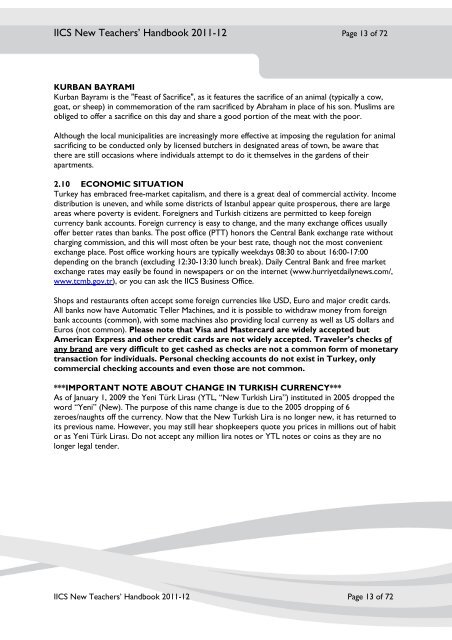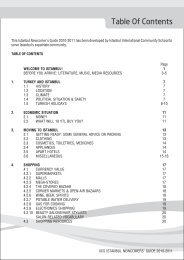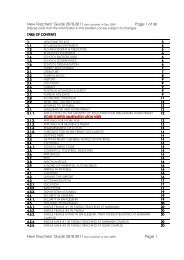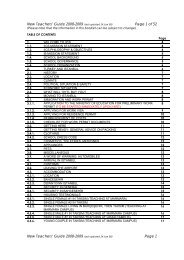IICS New Teachers' Handbook 2011-12 - Istanbul International ...
IICS New Teachers' Handbook 2011-12 - Istanbul International ...
IICS New Teachers' Handbook 2011-12 - Istanbul International ...
Create successful ePaper yourself
Turn your PDF publications into a flip-book with our unique Google optimized e-Paper software.
<strong>IICS</strong> <strong>New</strong> Teachers’ <strong>Handbook</strong> <strong>2011</strong>-<strong>12</strong> Page 13 of 72<br />
KURBAN BAYRAMI<br />
Kurban Bayramı is the "Feast of Sacrifice", as it features the sacrifice of an animal (typically a cow,<br />
goat, or sheep) in commemoration of the ram sacrificed by Abraham in place of his son. Muslims are<br />
obliged to offer a sacrifice on this day and share a good portion of the meat with the poor.<br />
Although the local municipalities are increasingly more effective at imposing the regulation for animal<br />
sacrificing to be conducted only by licensed butchers in designated areas of town, be aware that<br />
there are still occasions where individuals attempt to do it themselves in the gardens of their<br />
apartments.<br />
2.10 ECONOMIC SITUATION<br />
Turkey has embraced free-market capitalism, and there is a great deal of commercial activity. Income<br />
distribution is uneven, and while some districts of <strong>Istanbul</strong> appear quite prosperous, there are large<br />
areas where poverty is evident. Foreigners and Turkish citizens are permitted to keep foreign<br />
currency bank accounts. Foreign currency is easy to change, and the many exchange offices usually<br />
offer better rates than banks. The post office (PTT) honors the Central Bank exchange rate without<br />
charging commission, and this will most often be your best rate, though not the most convenient<br />
exchange place. Post office working hours are typically weekdays 08:30 to about 16:00-17:00<br />
depending on the branch (excluding <strong>12</strong>:30-13:30 lunch break). Daily Central Bank and free market<br />
exchange rates may easily be found in newspapers or on the internet (www.hurriyetdailynews.com/,<br />
www.tcmb.gov.tr), or you can ask the <strong>IICS</strong> Business Office.<br />
Shops and restaurants often accept some foreign currencies like USD, Euro and major credit cards.<br />
All banks now have Automatic Teller Machines, and it is possible to withdraw money from foreign<br />
bank accounts (common), with some machines also providing local curreny as well as US dollars and<br />
Euros (not common). Please note that Visa and Mastercard are widely accepted but<br />
American Express and other credit cards are not widely accepted. Traveler’s checks of<br />
any brand are very difficult to get cashed as checks are not a common form of monetary<br />
transaction for individuals. Personal checking accounts do not exist in Turkey, only<br />
commercial checking accounts and even those are not common.<br />
***IMPORTANT NOTE ABOUT CHANGE IN TURKISH CURRENCY***<br />
As of January 1, 2009 the Yeni Türk Lirası (YTL, “<strong>New</strong> Turkish Lira”) instituted in 2005 dropped the<br />
word “Yeni” (<strong>New</strong>). The purpose of this name change is due to the 2005 dropping of 6<br />
zeroes/naughts off the currency. Now that the <strong>New</strong> Turkish Lira is no longer new, it has returned to<br />
its previous name. However, you may still hear shopkeepers quote you prices in millions out of habit<br />
or as Yeni Türk Lirası. Do not accept any million lira notes or YTL notes or coins as they are no<br />
longer legal tender.<br />
<strong>IICS</strong> <strong>New</strong> Teachers’ <strong>Handbook</strong> <strong>2011</strong>-<strong>12</strong> Page 13 of 72





